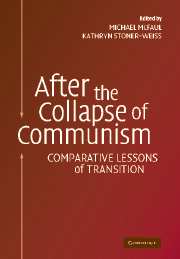Book contents
- Frontmatter
- Contents
- Contributors
- Introduction: The Evolving Social Science of Postcommunism
- 1 The Triumph of Nation-States: Lessons from the Collapse of the Soviet Union, Yugoslavia, and Czechoslovakia
- 2 The Fourth Wave of Democracy and Dictatorship: Noncooperative Transitions in the Postcommunist World
- 3 Circumstances versus Policy Choices: Why Has the Economic Performance of the Soviet Successor States Been So Poor?
- 4 Whither the Central State? The Regional Sources of Russia's Stalled Reforms
- 5 Parties, Citizens, and the Prospects for Democratic Consolidation in Russia
- 6 Comparative Democratization: Lessons from Russia and the Postcommunist World
- 7 Russians as Joiners: Realist and Liberal Conceptions of Postcommunist Europe
- Index
6 - Comparative Democratization: Lessons from Russia and the Postcommunist World
Published online by Cambridge University Press: 07 September 2011
- Frontmatter
- Contents
- Contributors
- Introduction: The Evolving Social Science of Postcommunism
- 1 The Triumph of Nation-States: Lessons from the Collapse of the Soviet Union, Yugoslavia, and Czechoslovakia
- 2 The Fourth Wave of Democracy and Dictatorship: Noncooperative Transitions in the Postcommunist World
- 3 Circumstances versus Policy Choices: Why Has the Economic Performance of the Soviet Successor States Been So Poor?
- 4 Whither the Central State? The Regional Sources of Russia's Stalled Reforms
- 5 Parties, Citizens, and the Prospects for Democratic Consolidation in Russia
- 6 Comparative Democratization: Lessons from Russia and the Postcommunist World
- 7 Russians as Joiners: Realist and Liberal Conceptions of Postcommunist Europe
- Index
Summary
RECENT DEMOCRATIZATION
Our understanding of recent democratization, both in theoretical and empirical terms, has been strongly influenced by the experiences of Latin America and southern Europe. This is largely because the global wave of democratization began in these two regions. At the same time, scholars with expertise in these areas had an analytical advantage: they had long wrestled with issues of regime change, in whatever direction. Indeed, when a group of specialists in these two regions first convened at the Social Science Research Council to think together about democratization, the countries they studied were for the most part not yet moving from authoritarian to democratic rule.
The contributions of the transitions school, as members of this group came to be known, have been considerable. However, a question remains. Do the approaches, the concepts, and the arguments that have developed in the course of analyzing democratization in the “south” still stand, once we broaden our geographical and, therefore, historical and variable horizons? Does the addition of new cases, in short, lead us to rethink the origins, the practices, and the sustainability of new democracies?
The purpose of this chapter is to provide an answer to this question, by adding the postcommunist experience to the equation. In particular, I will conduct a conversation between two bodies of research: analyses of Latin America and southern Europe, which have collectively constituted the reigning wisdom in the field of democratization studies, and analyses of postcommunist politics in general and Russian politics in particular.
- Type
- Chapter
- Information
- After the Collapse of CommunismComparative Lessons of Transition, pp. 207 - 231Publisher: Cambridge University PressPrint publication year: 2004
- 8
- Cited by



